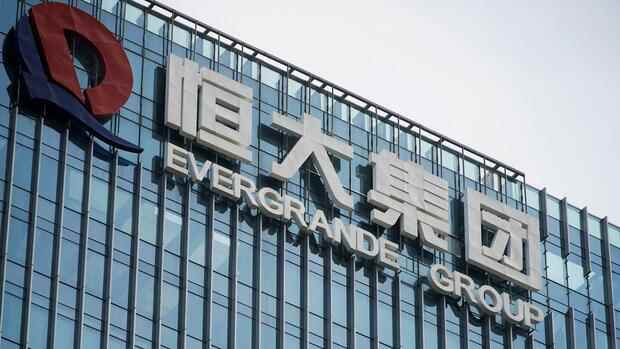Beijing The government of Guangdong Province, where the company is headquartered, is now intervening in the crisis surrounding the heavily indebted Chinese construction developer Evergrande. As she announced on Friday night, at the request of Evergrande, she will send a team to the company to “resolve its risks, improve internal risk management and maintain normal business operations”.
Evergrande had previously warned the Hong Kong Stock Exchange of a possible default on dollar bonds. “Given the current liquidity status of the group, there is no guarantee that the group will have sufficient funds to continue meeting its financial commitments,” said Evergrande’s announcement.
The company wants “to work actively with the offshore creditors to create a workable restructuring plan for the company’s offshore debt for the benefit of all concerned.”
The news sent Evergrande’s price on the Hong Kong Stock Exchange plummeting. The real estate developer’s papers temporarily lost more than 13 percent.
Top jobs of the day
Find the best jobs now and
be notified by email.
The real estate developer, one of the most heavily indebted companies in the world, had scraped past the insolvency several times in the past few months, but in the end always managed to meet its coupon payments.
Evergrande has more than $ 300 billion in debt on its balance sheet. There is also speculation about other off-balance sheet liabilities. In the past few months, the company had made several attempts to raise liquid funds, for example by selling real estate or investments.
Further interest payments on dollar bonds are due
According to a report by the Chinese business magazine Caixin, Evergrande will pay more interest payments on dollar bonds in the coming weeks, including $ 82.4 million in coupon payments for two bonds before December 6th. In addition, coupon payments totaling US $ 253 million are due on December 28 for two more bonds and US $ 415 million for seven more bonds in January.
Also on Monday it was not clear whether Evergrande had fulfilled its obligations from the coupon payments due on December 6 or not.
The Chinese leadership tried to allay investor worries over the weekend. The Evergrande case has no impact on normal financing in the real estate market, the headline “Economic Daily”, a Communist Party-controlled newspaper, said on Saturday.
The Evergrande risk case is an “isolated phenomenon” in the market economy and should “not be overestimated, but it should serve as a warning to other real estate companies and underline the importance of a solid working method”, the article from “Economic Daily” continued.
Previously, in an apparently coordinated action, several Chinese authorities tried to appease with individual statements on Friday, including the Chinese Central Bank (PBOC), the Chinese Securities and Markets Authority (CSRC), the Supervisory Authority for Banking and Insurance (CBIRC) and the Ministry for Housing and Rural Development (MHURD).
Evergrande’s problem was mainly caused by “its own mismanagement” and “breakneck expansion,” the PBOC said on the website. The sale of apartments, the purchase of land and financing have already returned to normal in China.
The Central Bank of China will continue to work with the Guangdong provincial government, relevant authorities and local governments in risk management “to promote stable and healthy development of the real estate sector and protect the legal rights and interests of homebuyers.”
The Chinese real estate industry is currently developing “generally healthy, and most real estate companies are focused on their main business and operate solidly,” said a spokesman for the CSRC. The effects of the risk incident at the Evergrande Group on the stable functioning of the capital market are “controllable”.
Not only Evergrande but other real estate developers had run into serious financial difficulties after the Chinese leadership announced stricter rules for borrowing in the heavily debt-financed industry in late 2020.
Fear of domino effect
The turmoil in the Chinese real estate market had fueled concerns that a collapse of Evergrande, for example, could lead to a domino effect and also put international financial markets under stress. Because the real estate sector is estimated to contribute between a quarter and a third of China’s economic output, analysts have already revised their growth forecasts for the People’s Republic this year downwards.
In fact, the Chinese real estate market has come under significant pressure in the past few months. It is true that the Chinese authorities and some local governments have now backed off a bit and have relaxed the strict requirements for banks when it comes to lending to property buyers and property developers, for example.
But sales of residential real estate fell by more than 24 percent in October, as a survey by the analysis company Creditinsights shows. The prices for new real estate also fell significantly. In October alone, the average price in 70 cities fell by 0.25 percent compared to the previous month – the largest monthly decline in six years.
More: According to its own statements, the Chinese transport service provider Didi wants to go public in Hong Kong. More hardship threatens Chinese tech companies
